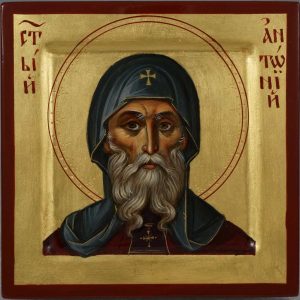 St. Anthony the Great, also called St. Anthony the Abbot (though he was a hermit) and St. Anthony of Egypt is commemorated on January 17. He is identified as the founder of desert monasticism, though the story of his life, particularly how he met St. Paul of Thebes, who preceded him into the desert, is a study of the search for Christian perfection. This story tells how he heard the gospel about the rich young man, to whom Jesus said, “If you wish to be perfect, go, sell what you have and give to the poor, and you will have treasure in heaven” (Matthew 19:21). When Anthony heard this gospel, he immediately divested himself of all his possessions and went into the desert to seek Christian perfection. This is really the calling of all Christians, as Jesus commanded, “Be perfect, just as your heavenly Father is perfect” (Matthew 5:47). For this we are baptized, that we might seek Godly perfection. St. Anthony imitated Christ when he heard this gospel, and just as Jesus went out into the desert after his baptism by John, in order to foil the wiles of Satan, so, too, does Anthony go to the desert to conquer the evil passions exploited by the temptation of the devil.
St. Anthony the Great, also called St. Anthony the Abbot (though he was a hermit) and St. Anthony of Egypt is commemorated on January 17. He is identified as the founder of desert monasticism, though the story of his life, particularly how he met St. Paul of Thebes, who preceded him into the desert, is a study of the search for Christian perfection. This story tells how he heard the gospel about the rich young man, to whom Jesus said, “If you wish to be perfect, go, sell what you have and give to the poor, and you will have treasure in heaven” (Matthew 19:21). When Anthony heard this gospel, he immediately divested himself of all his possessions and went into the desert to seek Christian perfection. This is really the calling of all Christians, as Jesus commanded, “Be perfect, just as your heavenly Father is perfect” (Matthew 5:47). For this we are baptized, that we might seek Godly perfection. St. Anthony imitated Christ when he heard this gospel, and just as Jesus went out into the desert after his baptism by John, in order to foil the wiles of Satan, so, too, does Anthony go to the desert to conquer the evil passions exploited by the temptation of the devil.
The monastic calling is an intensification of our baptismal calling, the renunciation of all worldly concerns to find perfection in the grace of Christ. Therefore, in Eastern theology, consecration as a monastic (monk or nun) has been deemed a sacramental mystery, not a separate mystery, but as part of the mystery of repentance.
In a similar way, Holy Orders and Marriage are also considered sacramental mysteries, because they confirm the baptismal calling in a particular vocation of life. St. Anthony, then, is a model for our life in Christ through baptism, which is called enlightenment, the perfection of the wisdom that leads us to life. We pray, then, to our Holy Father Anthony, “Having clearly received immortality and eternal life, pray for my darkened soul to be enlightened by the light of grace, so that I may worthily praise you; for you bear the Three-fold Light, O Father Anthony! (Matins, Ode 1)” “O Anthony, father of fathers, you have been shown to be a light for those who share your way of life, having taught the pious to tread the paths of light; and you emit the flame and fire of lightning, consuming hordes of the demons. (Matins, Hymn of Light)”
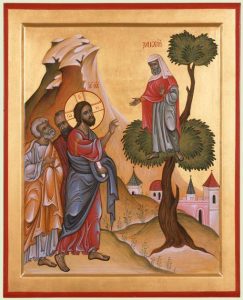 1 Timothy 4:9-16; Luke 19:1-10
1 Timothy 4:9-16; Luke 19:1-10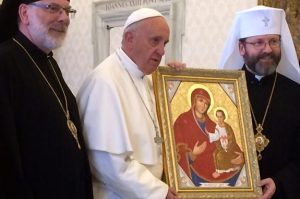 Holy See Press Office Director Greg Burke issued a statement today, January 12, stating that Pope Francis has accepted an invitation from His Beatitude Sviatoslav Shevchuk, Archbishop Major of Kyiv-Halyč of the Ukrainians and, on Sunday, January 28 at 4 pm, will visit the Basilica of Santa Sophia in Rome and meet with the Ukrainian Greek-Catholic community.
Holy See Press Office Director Greg Burke issued a statement today, January 12, stating that Pope Francis has accepted an invitation from His Beatitude Sviatoslav Shevchuk, Archbishop Major of Kyiv-Halyč of the Ukrainians and, on Sunday, January 28 at 4 pm, will visit the Basilica of Santa Sophia in Rome and meet with the Ukrainian Greek-Catholic community.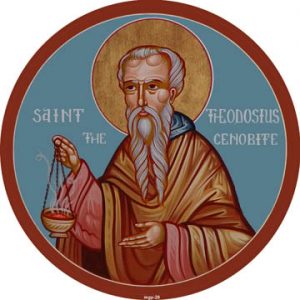 On the weekly liturgical calendar for this week you may have noticed that today’s saints is Theodosius, the Venerable Father and founder of monastic life lived in community.
On the weekly liturgical calendar for this week you may have noticed that today’s saints is Theodosius, the Venerable Father and founder of monastic life lived in community.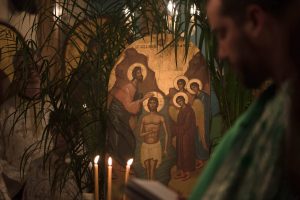 Remember us, O God; from age to age be our comforter. You have given us the wonder of time, blessings in days and nights, seasons and years. Bless your children at the turning of the year and fill the months ahead with the bright hope that is ours in the coming of Christ. You are our God, living and reigning, forever and ever. Amen.
Remember us, O God; from age to age be our comforter. You have given us the wonder of time, blessings in days and nights, seasons and years. Bless your children at the turning of the year and fill the months ahead with the bright hope that is ours in the coming of Christ. You are our God, living and reigning, forever and ever. Amen. Info for those attending the
Info for those attending the